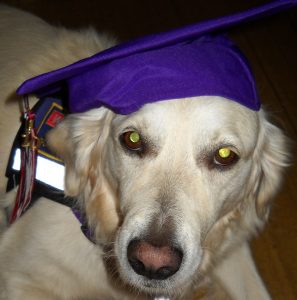Talk about a tough graduate research assignment: Watching puppy videos. Where can I sign up?
Seriously … it’s been done. A research team watched hundreds of hours of video of puppies interacting with their moms. The goal was to evaluate how the way moms treated their very young puppies affected the pups’ future success as guide dog candidates. But the results are interesting to any dog lover.
An early paper by the team, led by researcher Emily Bray, looked at variations in maternal style. A later paper, just out, looks at the correlation between the mom’s parenting style and the dogs’ success in guide dog training. They studied 21 litters of puppies whelped at The Seeing Eye, in New Jersey of three breeds.
These puppies have every advantage in life — great breeding, excellent medical care and nutrition, early puppyhood enrichment, the finest educational and social opportunities. Even so, a large proportion of guide dog puppies don’t graduate as guide dogs. Some are released for health reasons, some for behavioral reasons, and some for temperamental reasons. The influence of the mom on behavior and temperament are of particular interest, since all guide dog organizations strive to increase their graduation rates.
Some of the findings on maternal behavior were:
- Labrador moms spent more time with each pup than German Shepherd moms.
- New moms spent more time with their pups than more experienced moms.
- Moms with smaller litters spent more time in contact with the litter than moms with large litters as well as with individual pups.
- Highly attentive moms were found to have higher levels of cortisol, a stress hormone that could indicate more anxiety in those moms.
Next, the researchers looked at whether the differences in moms’ level of engagement with pups and anxiety or stress levels correlated with differences in puppy behavior. The differences appear to have a significant effect.
Helicopter moms, those who spent more time with their newborns, licking and cuddling them, and who lay down to nurse, providing the pups easy, constant access to food had less successful pups. The moms who made the puppies work a little harder to nurse — nursing while the mom was standing, for example, ended up being better problem-solvers. Puppies whose moms were more distant appeared to be better able to cope with changes, possibly because they learned to cope with more variations in their environment, starting at a younger age, than puppies who were more sheltered or comforted by their moms.
Additional possibilities the results raise are that more anxious moms, those with higher cortisol levels, produce more anxious pups — who are less likely to excel as guide dogs. Or it could all be genetic. It’s too soon to know for sure, since so little research has looked at mom-pup interactions and attempted to draw correlations between maternal behavior and pups’ future success. But it’s certainly something to think about!
The early study on maternal behavior is available online: Characterizing Early Maternal Style in a Population of Guide Dogs.
The abstract of the later study is available here: Effects of maternal investment, temperament, and cognition on guide dog success.

